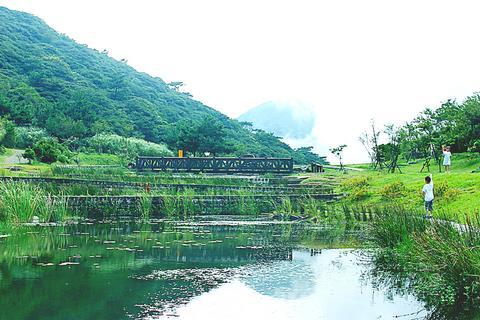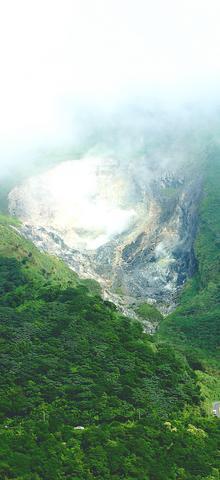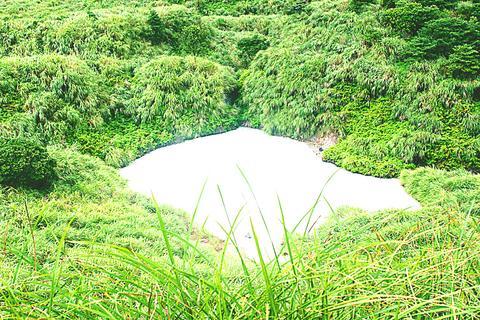Yangmingshan National Park is a welcome retreat from the city of Taipei spread below . It offers a convenient location for fresh air, walks, lunch and general recreation.
Start at the Park Headquarters and Visitor Center, in the center of the park. The bilingual staff are available to answer your queries from 9am until 5pm, Monday to Sunday. They also provide a map of Yangmingshan, which is equally helpful.
Something to prepare yourself for is the fact that the rolling hills and twisting paths throughout the park are not quiet. On the weekends there are families, but in the week there is the overwhelming noise of cicadas and their screeching symphonies.

PHOTO: ADAM ULFERS, TAIPEI TIMES
The Lengshuikeng area in Yangminshan is one of the most easily accessible areas and well-known attractions. These include a spring with warm rather than piping hot water; and Milk Pond, where a path leads visitors, old and young, on a mild stroll bordering the waters.
At nearby Qingtiangang is a picnic spot, popularly known as Buffalo Meadows because of the number of water buffalo that squat there daily. This is a great spot to bring a spread of food and drink with your significant other or family.
From both Lengshuikeng and Qingtiangang, Seven Star Mountain is impossible to miss. It towers over Taipei and the rest of the park as the tallest peak.

PHOTO: ADAM ULFERS, TAIPEI TIMES
The stairway trail leading to the summit, at first sight appears a manageably short 2.5km. At points though, the path becomes a nerve-racking, almost vertical ascent. The trail begins at Seven Star Park and after a brief stair climb one finds a paved one-way road. Once the trail passes a radio broadcast building, it becomes more demanding and the views more breathtaking. The hike requires no special skill beyond the ability to climb what seems innumerable stairs.
Seven Star Mountain is an old volcano and is still spitting on its western slope at Xiaoyoukeng. The vents are the most active in the area, so unless you're keen on dying from sulfur asphyxiation or serious burns, keep your distance. The best view of the spouts is from across the valley on Bailaka Road. Drive along the road adjacent to the sulfur pits and then turn left on Bailaka Road toward Bamboo Lake valley on your way to Datun Nature Park.
Datun Mountain is on the western side of the park surrounded by soft, handicapped-accessible trails. The flat hike initially leads to pleasantly landscaped Erzhiping Pond.

PHOTO: ADAM ULFERS, TAIPEI TIMES
Datun Mountain is actually three mountains sharing the same name, composed of a main, southern and western peak.
There are trails to visit each peak and a circumnavigation of the summits and sites in the area is well worth the time. The main peak, the highest, has a heavily trafficked road which goes all the way to the top.
The other two peaks are an entirely different story. The paths are well marked on the complimentary map from the visitor center, but the overgrown Japanese silver grass shrubs are not going to let you find them as easily. If you have your heart set on the southern and western summits, leave Grandma behind unless she insists on some thrills and spills.
The trails have sections with trees you would swear have eyes and others that are steep, slippery and lined with ropes to assist along the way. The most exciting sections provide a cliffhanger-like elation, but are disappointingly short.
If you are looking for technical rock climbing or weekend camping trips, a long trip down south is probably your best bet. Otherwise Yangmingshan is an excellent alternative for Taipei City residents, providing the same distraction for a smaller investment of time and energy.
Follow the trails laid out here or choose your own adventure, just get out and make a day of it.

This is the year that the demographic crisis will begin to impact people’s lives. This will create pressures on treatment and hiring of foreigners. Regardless of whatever technological breakthroughs happen, the real value will come from digesting and productively applying existing technologies in new and creative ways. INTRODUCING BASIC SERVICES BREAKDOWNS At some point soon, we will begin to witness a breakdown in basic services. Initially, it will be limited and sporadic, but the frequency and newsworthiness of the incidents will only continue to accelerate dramatically in the coming years. Here in central Taiwan, many basic services are severely understaffed, and

It is a soulful folk song, filled with feeling and history: A love-stricken young man tells God about his hopes and dreams of happiness. Generations of Uighurs, the Turkic ethnic minority in China’s Xinjiang region, have played it at parties and weddings. But today, if they download it, play it or share it online, they risk ending up in prison. Besh pede, a popular Uighur folk ballad, is among dozens of Uighur-language songs that have been deemed “problematic” by Xinjiang authorities, according to a recording of a meeting held by police and other local officials in the historic city of Kashgar in

Jan. 5 to Jan. 11 Of the more than 3,000km of sugar railway that once criss-crossed central and southern Taiwan, just 16.1km remain in operation today. By the time Dafydd Fell began photographing the network in earnest in 1994, it was already well past its heyday. The system had been significantly cut back, leaving behind abandoned stations, rusting rolling stock and crumbling facilities. This reduction continued during the five years of his documentation, adding urgency to his task. As passenger services had already ceased by then, Fell had to wait for the sugarcane harvest season each year, which typically ran from

The People’s Republic of China (PRC) was out in force in the Taiwan Strait this week, threatening Taiwan with live-fire exercises, aircraft incursions and tedious claims to ownership. The reaction to the PRC’s blockade and decapitation strike exercises offer numerous lessons, if only we are willing to be taught. Reading the commentary on PRC behavior is like reading Bible interpretation across a range of Christian denominations: the text is recast to mean what the interpreter wants it to mean. Many PRC believers contended that the drills, obviously scheduled in advance, were aimed at the recent arms offer to Taiwan by the